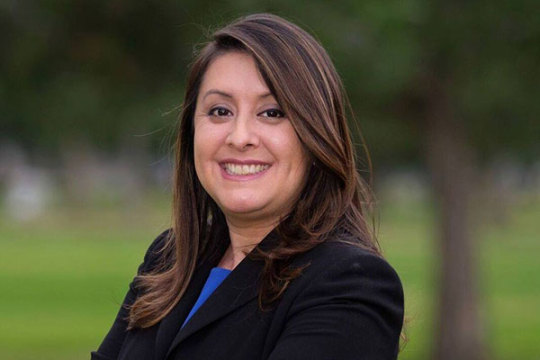
Candidate campaign page: https://www.luzforassembly.com/
An engineer by education, Luz Rivas has a track record on safe streets during her tenure as a Public Works Commissioner. She provided support for many projects spearheaded by Pacoima Beautiful (a local advocacy group), including the Pacoima Wash initiative and the Pacoima Urban Greening Plan. As founder of non-profit, DIY Girls, Rivas has experience empowering women that is much-needed in the light of recent sexual misconduct allegations in Sacramento. Rivas’ response to Bike The Vote L.A. shows an excellent approach to improving mobility options in California, including support for complete streets funding and to clarify the rights of people on bikes under the vehicle code. Rivas is an inspiring candidate who has the prospect of being a strong supporter for safe streets within the California Assembly.
Bike The Vote L.A. 2018 Primary Grade: A-
(See below for full candidate questionnaire response)
1. The California Air Resources Board estimates that transportation accounts for 37% of California’s annual carbon emissions. What actions would you take as assemblymember to ensure that California creates a more sustainable transportation system?
As an assemblymember, I will work to improve access to public transportation in the San Fernando Valley. In the 39th District, my vision is for the East San Fernando Valley Transit Corridor to become a reality. The project will include result in a light rail system that will improve transportation options for residents of the East San Fernando Valley. This rail system will connect to other regional transportation systems such as the Metrolink. I will work with local elected officials to help create these sustainable transportation solutions.
2. Cap & trade funds offer a unique opportunity to prioritize sustainable transportation, particularly in low-income neighborhoods negatively affected by pollution caused by cars. Do you support dedicating a portion of cap and trade funds towards the Active Transportation Program to help fund better pedestrian and bicycle infrastructure?
We need to assure that environmental justice communities are benefiting from cap and trade. I support using cap and trade funds to be allocated towards the ATP to help fund better pedestrian and bicycle infrastructure especially in low-income neighborhoods.
3. In Los Angeles, low-income communities of color are disproportionately burdened by the impacts of streets designed primarily for cars, without receiving proportional funding for their mobility modes like walking, biking, and public transit. Would you support legislation to add a ‘complete streets’ policy to SB 1, California’s newly augmented gas tax, to require all street and highway projects to incorporate the needs of pedestrians, bicyclists and transit-dependent communities?
Our streets should be planned and designed to allow safe access for various mobility modes such as walking and biking. I would support a ‘complete streets’ policy addition to SB1 to assure that the needs of pedestrians and bicyclists are incorporated in street and highway projects.
4. California law regarding the position bicyclists can occupy in a traffic lane is written in a confusing manner. The typical condition – in which the rightmost lane is too narrow for a car and a bicycle to travel safely side-by-side and the bicyclist is thus allowed to use the full lane – is written as an exception rather than the default standard. As a result, despite public information campaigns such as “Every Lane Is A Bike Lane,” there is frequently confusion from the general public and even law enforcement agencies on the legality of bicyclists riding in traffic lanes on California roads. Do you support re-wording traffic law to clarify the right of people on bikes to ride to maximize their visibility and safety?
The confusion on whether a bicyclist is allowed to use a full street lane needs to be clarified. We need to educated the public and law enforcement agencies to understand that law. I do support re-wording traffic law in a way that till clarify and educate the public of the right of bicyclists to ride safely.
5. A recent study by the National Transportation Safety Board found that speeding was one of the most common factors in crashes, and one of the highest contributors towards fatal crashes. Despite this fact, speed limits across California are consistently raised due to a state law that sets speed limits at the 85th percentile of measured driving speeds. Do you support reform to the 85th percentile rule to give local jurisdictions the ability to set speed limits to better promote safe driving?
I would support implementation of automated speed enforcement that assures privacy and civil liberties are met.
6. California’s ongoing housing crisis challenges cities and communities to provide solutions towards meeting California’s demand for housing. Do you support efforts at the state level to accommodate smart growth, transit-oriented development, and sustainable communities that empower residents to get around on foot, by bike, and on quality public transit? What specific policies you would pursue to promote sustainable and affordable living for Californians?
I support transit-oriented housing development. Transit hubs are where it makes sense to build housing and will result in less traffic and an increase in public transportation use. I would work to ensure that not all housing built near public transit is luxury housing. We need Californians of all income levels to benefit from transit-oriented housing.
